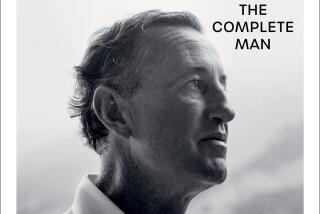Concrete Realities on a Nazi-Held British Isle
- Share via
Located off the coast of Normandy in the swath of ocean separating England from France, the Channel Islands were the only British territory occupied by the Nazis. In recent years, the British have been considering what it was actually like for their fellow subjects to live in this atmosphere of coercion and complicity. Unlike other conquered countries, the Channel Islands had no organized anti-Nazi resistance.
Nazi-occupied Guernsey is the setting of Tim Binding’s third novel, “Lying With the Enemy,” an intriguing and ambitious blend of mystery, history, and suspense. Binding has created a large cast of distinctive characters, whose qualities, good and ill, emerge under the pressures of the peculiar circumstances of enemy occupation.
For the cultivated introspective Nazi Maj. Gerhard Lentsch, Guernsey is an idyllic place where he hopes to settle down, eventually, with one of the pretty local girls, Isobel van Dielen, daughter of a wealthy contractor. Isobel is not the only girl to give a warm welcome to the island’s conquerors. A kind of holiday atmosphere prevails, with parties, dancing, theatrical shows and risque sex games. Those who disapprove keep silent.
Isobel’s ambitious father, meanwhile, is helping the Germans turn the island into a concrete-fortified bastion of Hitler’s empire. A single-minded man, unfriendly and ill at ease, Van Dielen’s main passions are futuristic design and cement. Laboring on the building project is a contingent of half-starved foreigners--political prisoners and members of “inferior” races--about whom no one seems to care very much.
Yet, as the novel opens early in 1943, the tide of the war is turning: Fortress Stalingrad has fallen to the Russians, and the surviving German soldiers are making an agonizing retreat. Lentsch, who once felt pride in his country’s “miraculous” recovery, harbors doubts about his Fuhrer. His fellow officers, however, lack his sensitivity--and his scruples.
When the body of Isobel van Dielen turns up in a bunker, her nose and mouth filled with cement, the insular world of Guernsey is shocked and baffled by the murder. Joining forces with the bereaved Lentsch to investigate is Guernsey police inspector Ned Luscombe, a decent, thoughtful, lower-middle-class young man who had also been romantically involved with Isobel. There is an affinity between the two men, but, under the circumstances, mutual trust is harder to establish.
Narrating in the third person, Binding explores the outlooks and emotions, not only of Lentsch and Luscombe, but of a great variety of individuals involved, directly or tangentially, in the mystery: the increasingly crazed Van Dielen; Lentsch’s rakish fellow officer, Capt. “Zep”; Luscombe’s taciturn Uncle Albert; his childhood friend Veronica, an easygoing, good-hearted girl whose head has been turned by the Germans; and a wraith-like teenage boy from the work camp. The story is complicated, with several surprising twists that not only create suspense, but also reveal characters’ psychology. The highly charged atmosphere grows more volatile as events unfold with a kind of relentless moral logic.
Binding paints a vivid portrait of this time and place, deftly modulating tone as he shifts from the lubricious and faintly comical to the bitterly ironic and intensely dramatic. Still more astonishing are his evocations of the mental landscapes of characters like Van Dielen, who feels a deeper love for concrete than for his wife or daughter: “[W]hat deceptive strength lay in those unassuming seeds, how soft they seemed, how easily they hardened, what creations they spawned. And like all living things it could only spring to life after water’s hydrogen kiss. . . . Like the rush of an avalanche it can cover the landscape . . . obliterating dip and hollow, inventing new worlds of flattened beauty.” By the end of this powerful and provocative novel, the atypical, anomalous outpost of Guernsey comes to possess a significance that resonates far beyond its borders.
More to Read
Sign up for our Book Club newsletter
Get the latest news, events and more from the Los Angeles Times Book Club, and help us get L.A. reading and talking.
You may occasionally receive promotional content from the Los Angeles Times.









